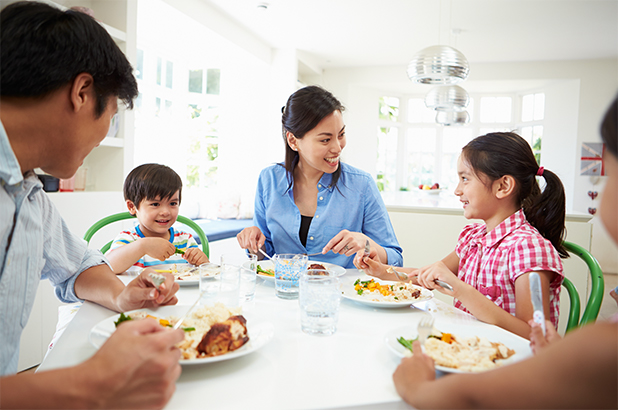Children in families who regularly eat meals together experience a wide range of benefits. They’re more resilient, have better self-esteem, do better academically, eat more fruits and vegetables, consume less alcohol and drugs, have a lower body mass index, and they have lower levels of stress and depression. And as an added bonus, children and parents tend to enjoy family meals!
But simply sitting together as a family and eating a meal isn’t what leads to all these benefits. Rather, mealtime gives families a chance to communicate about how to achieve these benefits, as well as promote family bonding and teach family values.
For productive family communication during mealtime, some families enforce rules, such as not using technology or cell phones at the table. But some family rules can hinder family communication, such as children sitting in silence because they’re told not to talk while they’re eating. Think about what rules might work best for how you want your family to navigate mealtime and communication.
One way to build family communication during mealtime is to ask open-ended questions. Open-ended questions encourage communication and feedback from children. Here are HPRC’s recommended mealtime conversation starters and open-ended questions for you to try with your family:
General conversation starters
- What are you most looking forward to today? (breakfast time conversation)
- What was the best part of your day? (dinnertime or nighttime snack conversation)
- What are you most thankful for?
- What makes you feel loved?
- What do you want to be when you grow up?
- What’s your favorite thing about our family?
- What more do you want to know about the story of our family or our family history?
Conversation starters for children ages 2–7
- What are your 3 favorite foods?
- What’s your favorite color?
- What’s your favorite number?
- What sport or activity would you like to try?
Conversation starters for kids ages 8–12
- What’s your favorite meal cooked at home?
- What’s your favorite activity or sport to play?
- If you could create a new holiday, what would it celebrate?
- What did you learn in school today? (dinnertime or nighttime snack conversation)
Conversation starters for teenagers
- What are your hopes and dreams?
- What’s the hardest part about being your age right now?
- What’s your greatest strength?
- What’s the thing you worry about the most?
- If you could have one question answered about your future, what would it be?
- What habit would you most like to break?
- What habit would you most like to start?
For tips about how to make mealtime a regular part of your weekly family schedule, view these HPRC articles:
Benefits of eating with your family
